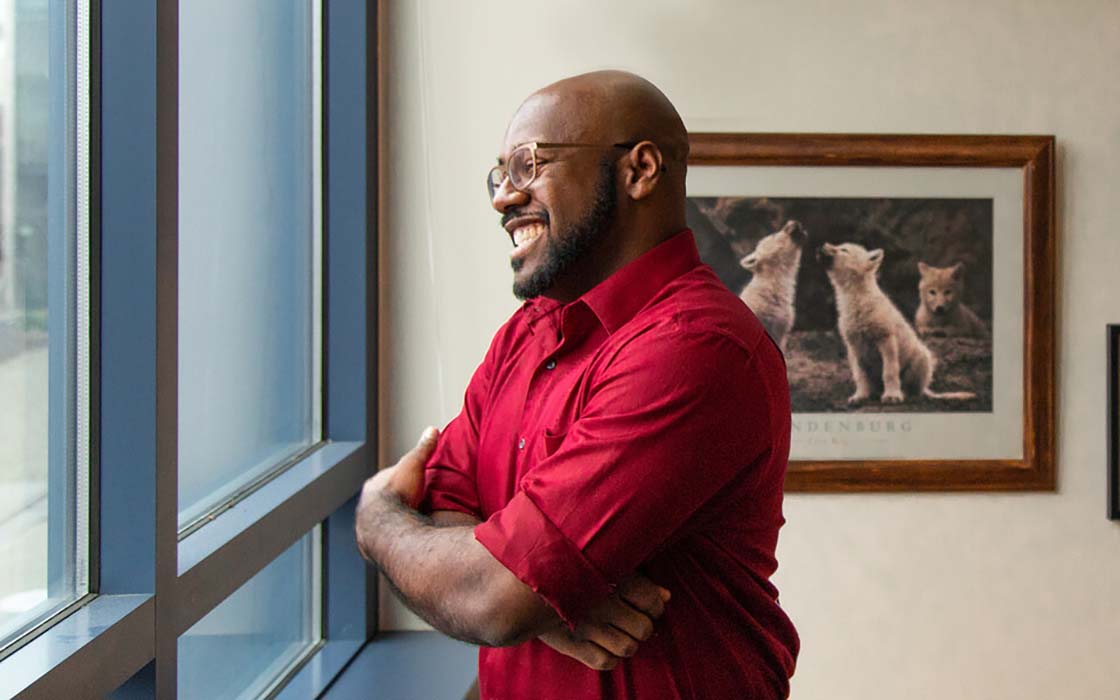
Urban Ecologist/Superhero
This Section's arrow_downward Theme Info Is:
- Background Image: ""
- Theme: "light-theme"
- Header Style: "purple_dominant"
- Card Height Setting: "consistent_row_height"
- Section Parallax: "0"
- Section Parallax Height: ""
UW Tacoma Assistant Professor Christopher Schell is a fan of the Marvel Cinematic Universe as evidenced by the Black Panther coffee cup and Black Panther bobble head on his desk. Schell is a scientist, not a superhero; but if he were to assume a secret identity he might be dubbed, “Coyote.”
Schell is an urban ecologist with an affinity for carnivores like coyotes. This interest goes back decades to his childhood in Pasadena, California. “As a kid I just remember coyotes being on the street all the time,” said Schell. “I lived near the Rose Bowl and there’s tons of wildlife in that area including raccoons and bobcats.”

Schell’s early interest in science and nature was bolstered by the film Jurassic Park. “I loved that movie as a kid and, as many scientists will tell you, we got into science thinking we were going to be the next Ian Malcolm or the next Alan Grant,” said Schell.
Schell’s parents encouraged his interests and steered him toward science fairs where he often won first place. “I don’t know if it’s correct to call me the oddball but I definitely liked science and math more than my friends did,” he said.
|
Summer Research at UW The UW Undergraduate Research Program has a long list of summer research opportunities. |
After high school Schell moved to New York City and Columbia University. “I originally thought about going into medicine,” he said. “I volunteered at St. Luke’s Hospital [now Mt. Sinai St. Luke’s] but found the hospital environment wasn’t stimulating to me,” he said. The following summer, Schell participated in the two-month long Summer Ecosystem Experiences for Undergraduates (SEE-U) program in the Dominican Republic, where he was able to develop his own independent study. “I was interested in predator-prey dynamics,” he said. Schell decided to study tarantulas. “It was a comparison between two different species — the golden orb weaver spider and tarantulas,” he said. “I wanted to understand the differences and similarities in how they hunt.”
Of course, to study tarantulas you need to catch them. “A friend and I noticed they lived under the stairs in our dorm [in the Dominican Republic],” said Schell. “They’d come at night to feed on click beetles then go back under the stairs.” One night, Schell and his friend went out with nets and managed to wrangle three tarantulas.
I like to think of myself as the Jeff Goldblum of urban ecology.
This project helped solidify Schell’s interest in “how animals do what they do and why they do it.” The following year, Schell connected with Columbia Professor Sarah Woolley and her lab group. “I worked on an undergraduate research thesis focused on kin recognition and vocalizations in zebra finches,” said Schell. “They [Wooley and the lab members] really helped show me what was possible.”
Schell graduated from Columbia in 2009 with a degree in psychology. He applied to several graduate schools and ultimately chose the University of Chicago. “I had an advisor who told me about a project looking at urban coyotes,” said Schell. Schell’s dissertation work with Drs. Jill Mateo and Rachel Santymire focused on parent-offspring relationships in coyotes.

Schell graduated from the University of Chicago in 2015 with a Ph.D. in evolutionary biology. Later that year Schell started his postdoctoral work at Colorado State University where he studied the behavior of urban coyotes in Denver and Fort Collins with mentors Drs. Stewart Breck and Lisa Angeloni.
Schell started at UW Tacoma this past fall and hit the ground running. He launched the Grit City Carnivore Project in collaboration with Point Defiance Zoo & Aquarium, Northwest Trek and Metro Parks Tacoma. “Our overall goal is to understand how carnivores are adapting to cities,” said Schell. “In natural environments, wolves, bears, and mountain lions serve as the top predators. Well, the same structure exists in urban environments,” he said, “and previous studies have shown that coyotes and raccoons serve that top-predator function in urban ecosystems.”
The multi-year project will include a citizen science angle where Tacoma residents can report sightings of urban wildlife such as coyotes and raccoons. Schell also has a lab on campus that will facilitate student research. “I have a student who’s interested in the differences in boldness and cognition between urban and rural crows and another student who’s investigating how seasonal variation in light influences activity patterns of a whole host of species,” he said.
A key component of Schell’s research is access. “I’m always looking at how to include people on the margins, those that don’t have the resources to participate in the sciences,” he said. “An important question for me going forward is how do we provide access to this research and learn from the communities we work with simultaneously.”
Maybe Christopher Schell is a superhero.
Recent news
Main Content
Gathering Strength
News Tags on this arrow_upward Story:
- None
Main Content
UW Tacoma Enrollment up 4% for Autumn 2024
News Tags on this arrow_upward Story:
- None
Main Content
Celebrating First Gen
News Tags on this arrow_upward Story:
- None



